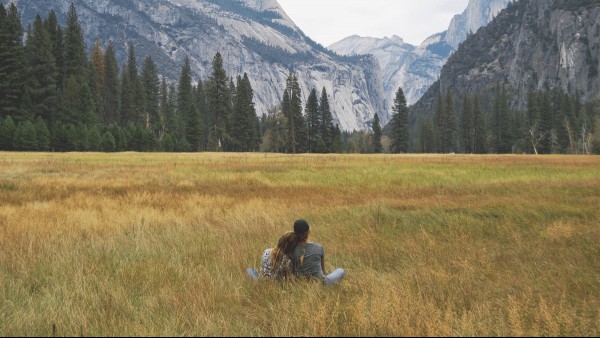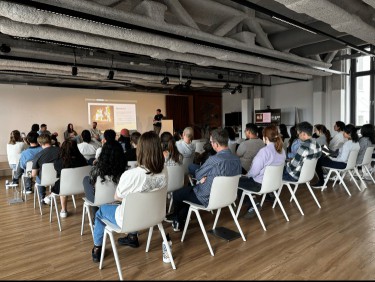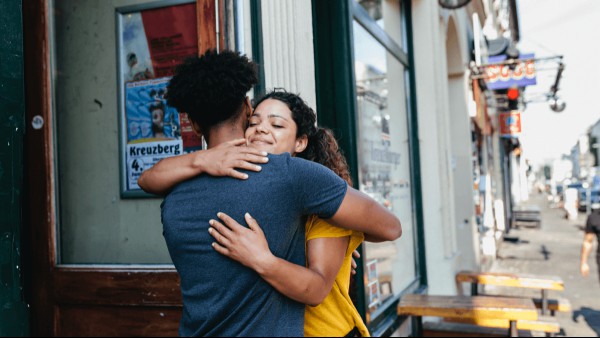Spanish Lesson: El Camino De Santiago
Learning Spanish is about much more than memorizing vocabulary. In each Spanish Lesson, we explore a part of the vast Spanish-speaking world with texts designed for beginner (A2) Spanish learners. Reading the following means you’re able to…
- understand and use basic verbs to talk about what one is doing now.
- express in simple terms where something is.
- talk about or understand a simple text on lifestyle, hobbies and sports.
- identify information from and get the gist of simple event-based articles, reports or tours.
Read on to learn about el Camino de Santiago. And if you get stuck on any of the bolded terms, you can scroll down to la lista de vocabulario, which will guide you along. You can also listen along to a recording of the story, read by a native Spanish speaker.
El Camino De Santiago
El Camino de Santiago es una conocida ruta de peregrinación en España. Tiene 12 siglos de historia. Su destino es Santiago de Compostela, Galicia. La tradición dice que el sepulcro del Apóstol de Santiago está en la catedral de la ciudad.
En España hay 9 rutas, o caminos, que van a Santiago de Compostela. La más popular es el Camino Francés. Esta ruta tiene 800 km y 31 etapas. Empieza en Saint Jean Pied de Port, Francia, y recorre el norte de España. Santiago de Compostela es el destino del Camino, pero hay personas que deciden ir hasta la legendaria Fisterra. Los romanos pensaban que Fisterra era el fin del mundo porque es el lugar más al oeste de España.
También es posible empezar el Camino desde diferentes puntos de Europa. Por eso, si prestas atención, puedes encontrar señales que indican la dirección a Santiago de Compostela en Polonia, Francia, o Alemania, entre otros países.
Antiguamente, los peregrinos caminaban durante días a Santiago por razones religiosas. En la actualidad, gente de todo el mundo hace el Camino por motivos diferentes: tener una experiencia espiritual, disfrutar de la naturaleza, desconectar o vivir una aventura.
Lista de vocabulario — Vocabulary list
Palabras temáticas — Thematic words
- ruta — route
- peregrino/a — pilgrim
- destino — destination
- siglo — century
- sepulcro — sepulcher, grave
- camino — way, path
- etapa — stage
- señal — sign
- motivo — reason
- razón — reason
- antiguamente — in the past
Verbos — Verbs
- recorrer — to travel through
- empezar — to start
- pensar — to think
- disfrutar — to enjoy
- desconectar — to disconnect
Expresiones — Expressions
- ruta de peregrinación — pilgrimage route
- en la actualidad — nowadays
- vivir una aventura — to live an adventure
RECOMMENDED NEWS

How To Say ‘I Love You’ In 10 Different Languages
Expressing love is an important matter in any language. Sorry to get sappy here, but love is somethi...

Here’s Why Storytelling Is One Of The Most Effective Ways To Learn A Language
Think back to when you were first learning your own native language. Your parents, teachers and care...

Behind the Scenes: a Fireside Chat on Inclusion and Women in Tech at Babbel
Last month, our Femgineering Community of Practice* and the Engineering Chapter** launched a new ini...

What Language Is Spoken On The International Space Station?
The days of Sputnik and Laika feel like ancient history by now, but the legacy set by the Space Race...

Conversation Guide: How To Introduce Yourself In Spanish
When you’re just beginning your journey as a Spanish learner, it can be hard to know where to start....

How To Talk About Feelings In Spanish
Talking about your emotions in any language can be tough. Having the right vocabulary is a good firs...
Comments on "Spanish Lesson: El Camino De Santiago" :